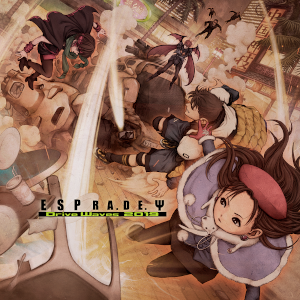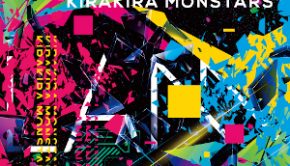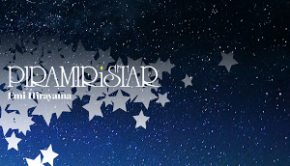ESP RA.DE. Ψ Drive Waves 2019
 |
Album Title: ESP RA.DE. Ψ Drive Waves 2019 |
| Record Label: Sweep Record |
|
| Catalog No.: SRIN-1166 |
|
| Release Date: December 25, 2019 |
|
| Purchase: Buy at Sweep Record |
Overview
The ESP RA.DE. Ψ Drive Waves 2019 soundtrack release accompanies the 1998 classic, ESP RA.DE, by CAVE, as brought to the modern era by M2, known for their work in porting classic games to modern systems. This soundtrack features the remixed soundtrack added to the game and features contributions from Supersweep’s mainstays Shinji Hosoe, Ayako Saso, Fumihisa Tanaka, Atsushi Ohara, and Takahiro Eguchi, in addition to Atsushi Ohara’s Akihabara Heavy Industry’s lineup of electronic artists, such as 909state, Atomic, Takayuki Kamiya, and polygon prompt. There is also a couple contributions from Ryu☆. How does this soundtrack alter the original’s experience and is it worth picking up?
Body
The album opens up with “ESP Person (Takahiro Eguchi Remix)” with its ethereal and wintry synths, bells, and industrial percussion. It’s a very beautiful, albeit short, remix that does justice to the original. Following the character select music, the various stage themes are remixed by a variety of composers, with each doing a rendition of a particular stage theme as well as their own interpretation of the stage boss theme, of which there was only one version in the original game. “DESPERATE SCHOOL (Ryu☆Remix)” is faithful to the original with a synthy melody lead and an energetic trance remix overall. His version of “RAGING DEICIDE” has a synth lead and a hard techno backbone. It, much like his stage theme remix, is quite recognizable. Takahiro Eguchi is responsible for the stage 2 music, “NIGHTMARE.” It’s a drum n’ bass remix with ominous and industrial elements, and is an excellent reinterpretation. His version of “RAGING DEICIDE” is a percussion heavy and dissonant remix that certainly has a lot of energy, but due to the chaotic nature of the theme, does result in something a bit less impactful.
Ayako Saso’s “ACT IN JUDGE” also keeps the original faithfully in mind with its bright synths and bubbly nature elevating the melody. There is also an airy and retro shmup feel to the overall remix and the rock elements help give it a bit of texture. Her version of the boss theme is more rock oriented and the blend of synth and rock work well while also retaining the identity of the original. The fourth stage themes, of which there are two, and its boss theme are all done by different individuals associated with the Akihabara Heavy Industry lineup. “WANGAN RAPID LINE 1st,” by Atsushi Ohara transforms it into more of a techno tune, and features plenty of heavy beats, industrial elements, and gives it more of an ominous touch. However, as it isn’t as melodically focused as other stage themes, this one may not stick with the listener as much. “WANGAN RAPID LINE 2nd,” by Takayuki Kamiya, still retains industrial elements, but the piano and soft synths give it a more uplifting sound; however, it does tend to lack a hook, given its focus more on atmosphere, rather than melody. The fourth rendition of “RAGING DEICIDE,” by polygon prompt, has a heavy dance beat, an industrial sound, and aggressive synths. The end result is another successful and recognizable rendition of the boss theme.
“YAKSA,” by Fumihisa Tanaka, is quite the transformation, taking the original and amping up its tempo and energy with a psytrance emphasis. The melodic elements are retained quite nicely and the blend of softer synths and industrial sounds works quite nicely. His hard trance remix of “RAGING DEICIDE” also works well as a hard trance influenced take and keeps the original recognizable while adding an energy of its own. 909state’s “Fairies Fear” is a minimalistic approach to the original and has an industrial, underground techno vibe, but may not be everyone’s cup of tea. The boss theme for this stage is remixed by Atomic and is a great remix. Not only does the energy match the image, but the switching of focus from beats with the melody more of an accompaniment and vice versa, is a nice touch. Lastly, Shinji Hosoe offers three remixes, all of which are a take on the same melody. “Rage” is a beautiful tune with soft synths and an ethereal quality to it. “Wing” adds choir and more intense beats, but retains the beauty of the original. Lastly, “Madness” retains the elements of the previous two tunes but is more ominous, tense, and distorted in nature, giving it a more industrial vibe. The ending theme, “Snow Illusion” by Fumihisa Tanaka, features bright wintry synths, bells, and light drum beats to create a calming, conclusory tune. There is also a second disc with extended versions of select themes that extend or add elements to the remixes heard on disc one. It’s a nice bonus.
Summary
The soundtrack for ESP RA.DE. Ψ Drive Waves 2019 is fairly successful. Given that it must be used in game, many of the tunes are recognizable interpretations of the original. There are a mix of styles, some more successful than others, so fans of the original soundtrack will likely hear something they like from these new interpretations. If you order from Supersweep’s store, there is also a separate bonus disc containing a DJ mix of select tunes on the album by Atsushi Ohara.
Do you agree with the review and score? Let us know in the comments below!
4
Posted on June 10, 2020 by Don Kotowski. Last modified on June 10, 2020.














